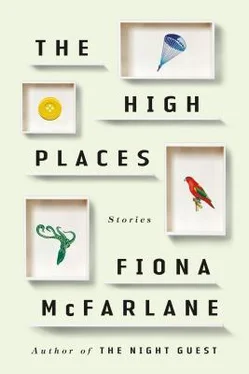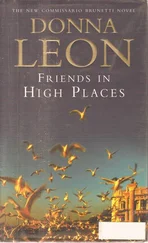‘Next to ours?’
‘Near ours,’ said Susan, ‘but not next to it.’
Alex pressed against his sister’s side. He said, ‘Will the boat go fast or slow?’
‘Very fast,’ said Lizzie.
‘Soon we’ll all be flying in planes to places like California,’ said Rose, and this seemed to disgust Lizzie; she turned away from the Coral Sea .
The zoo ferry, in comparison, was toy-small and overly bright. Alex ran toward it and had to be held back; he was thrilled and loud, as he had been about his navel. But Lizzie seemed sceptical. As they were walking across the narrow plank onto the boat, she gave a sudden cry, full of grief and fear, and people around them turned to look.
‘Are you frightened, Lizzie?’ said Rose. ‘Hold my hand. Don’t look down.’
Lizzie held her hand and took small steps across the plank, all the while looking down at the water, but once she had settled into a seat on the deck she no longer seemed afraid. As the ferry moved away from the quay, Alex complained of a ‘tummy feeling’, over which Susan fussed. Rose sat quietly beside quiet Lizzie, irritated as she always was by sick people, even children. Rose herself was never sick. But she helped Susan hold Alex against the railing as he threw up into the harbour, and she loved and pitied him, this small pale boy over all that water. They returned to their seats, where Lizzie waited tense and white. Rose and Susan bent their heads over the children as the ferry rocked.
The Sunday zoo was full of people, but Rose identified the dancers right away. There was a man she recognised with conspicuously red hair. She heard their accents and noted the surety and discipline with which they walked. Last night had been their final show and tomorrow they sailed on the Coral Sea ; for now they were seeing the sights. They eddied about in same-sex groups, interacting with loud jokes and theatrical gestures. Passing aviaries on the zoo’s sloping streets, Rose saw half a dozen of them sitting among the tropical birds, coaxing them onto arms and shoulders with a trick of the posture that was, Rose knew, beyond her own shoulders, her own arms.
Rose couldn’t see Adelaide Turner with the dancers, but she hoped she might, later on. Perhaps they would meet beside the polar bear and talk together on the subject of his greenish fur and his obvious disgruntlement in the unlooked-for heat. Then, tomorrow after work, while the Coral Sea unloosed from the city and took Susan and Adelaide to America, Rose could tell Robert about it. Or she could not tell him, just as she pleased.
Rose followed Susan and the children to the aquarium, with its rocky grottoes and litter of Pacific shells. Afterward, they saw the Malayan bears and spider monkeys. A band played in the rotunda and children sat by a pond while a Sunday-school teacher read instructions from a piece of paper. There was a black rhinoceros calf, but Lizzie and Alex seemed annoyed by baby animals of any kind. Alex’s eyes remained on the ponderous mother and Lizzie drooped against the fence.
‘Is this the first time Julia’s seen a rhino?’ asked Rose.
Now Lizzie looked hard at the baby. ‘I don’t know,’ she said.
Both children had begun the excursion with enthusiasm but were now almost shy. They stood on either side of the floral clock, following its fragrant moving hands; they remained silent on the little zoo train as it slid alongside emus and mountain goats. The very fact of mechanical movement seemed to have stunned them into noiselessness. It was as if their excitement for their trip to Sydney, and beyond to California, had all been worn out in the preparation for it; the actual journey was so large they couldn’t account for it. Susan appeared not to mind. Rose assumed her sister knew, from experience, that careful days of planned good cheer often turn out this way.
The children were too afraid to enter the reptile house, which was dark and green and cool. Alex lingered by the doorway, terrified but unwilling to leave. Lizzie couldn’t even bring herself to look at the picture of the snake on the sign. Their mother, for the first time, was visibly frustrated with them both. As Susan called Alex away, a flock of dancers ran screaming from the reptile house, women at first, then men leaping and laughing. They’d obviously given the women a scare — a snake-hiss, a careful brush against someone’s ankle, a low-voiced story that ended in shouts. Now the women clapped and scolded. Rose knew Adelaide Turner even without her costumes and wigs and drawn-on eyebrows; her round face and the agile manner of her walk were unmistakable. She looked very young. Adelaide called to one man — ‘Roger, what did I tell you? No cake for weeks!’ — and when Roger hung his head and arms in mock dejection, she mimicked his pose perfectly, teasing. Her blunt accent wasn’t as beautiful as her dancing. Rose could have taken one step and been in her path; she could have said, ‘Excuse me, Miss Turner?’ But what if Adelaide was to smile as if Rose had just called her name in order to say, Your table’s ready, your car is here? There was no way to tell Adelaide about the nocturnal gulls after the theatre, the sensation of her body rising from the bed. Rose watched the dancers walk down the hill toward the seal pools, the women quiet now, holding hands and resting their heads on their friends’ shoulders. It seemed ridiculous, then — juvenile — to have cut out Adelaide’s picture and put it on the mantelpiece.
Susan sat on the low wall beside the reptile house.
‘I want the snakes,’ said Alex. He had run into the building, quickly in and out, made brave by the presence of the dancers.
‘Well, Lizzie?’ said Susan.
Like Rose, Lizzie was watching the procession walk toward the seals. She waited until the dancers were out of sight before turning to her mother.
Susan said, ‘What do you think of taking your brother in to see the snakes? While your old mum has a rest out here.’
‘I’ll take him,’ said Rose.
‘I want to,’ said Lizzie. She gave a small, triumphant laugh. ‘ I was never frightened of the snakes.’
Alex seemed uneasy. He ran back into the semi-dark and his sister followed him.
‘They’re tired, aren’t they?’ said Rose.
Susan didn’t answer at once. Then she said, ‘We’re all tired, I think.’
‘You must be. So much to organise.’
‘I’ll tell you something. It’s absurd,’ said Susan. ‘It’s that I’m sure I’m going to see Jonathan again. I have that feeling. As if he’s waiting for me in California. You know, they say the climate there is basically Australian, and there’s the coast and gum trees.’ She laughed the way Lizzie had before saying, ‘ I was never frightened of the snakes.’
Rose held her sister’s hand, which may never have happened before; Susan was years older and rarely tender. Rose didn’t love her, but then she thought of love as a hasty secret that drew out, eventually, into something slow and denied and sought and carefully planned. Loving Jonathan had been small for her at first, and then grew smaller, but it was in this smallness that she had found pleasure and safety, as if the secrecy had necessarily pushed it into a tiny space of compacted intensity. Anything larger would have frightened her; would have led to change, or confession. Rose was made impatient by confession. The possibility of it had sent her to Sydney. And it was better, wasn’t it, that she could sit like this with Susan, holding hands.
The afternoon was beginning to lengthen. Currawongs cried out of bubbling throats. There were also stranger sounds that travelled through the air from an indeterminate source, as if sprung from the mouths of some outlandish animal and his equally extraordinary mate. These noises hummed at the back of the ear along with other incidental roars and calls and trumpets that filled this unfamiliar world, briefly jungle, briefly savannah and mountain range. Rose understood before Susan did that the noises were coming from the children. She ran toward the reptile house.
Читать дальше












